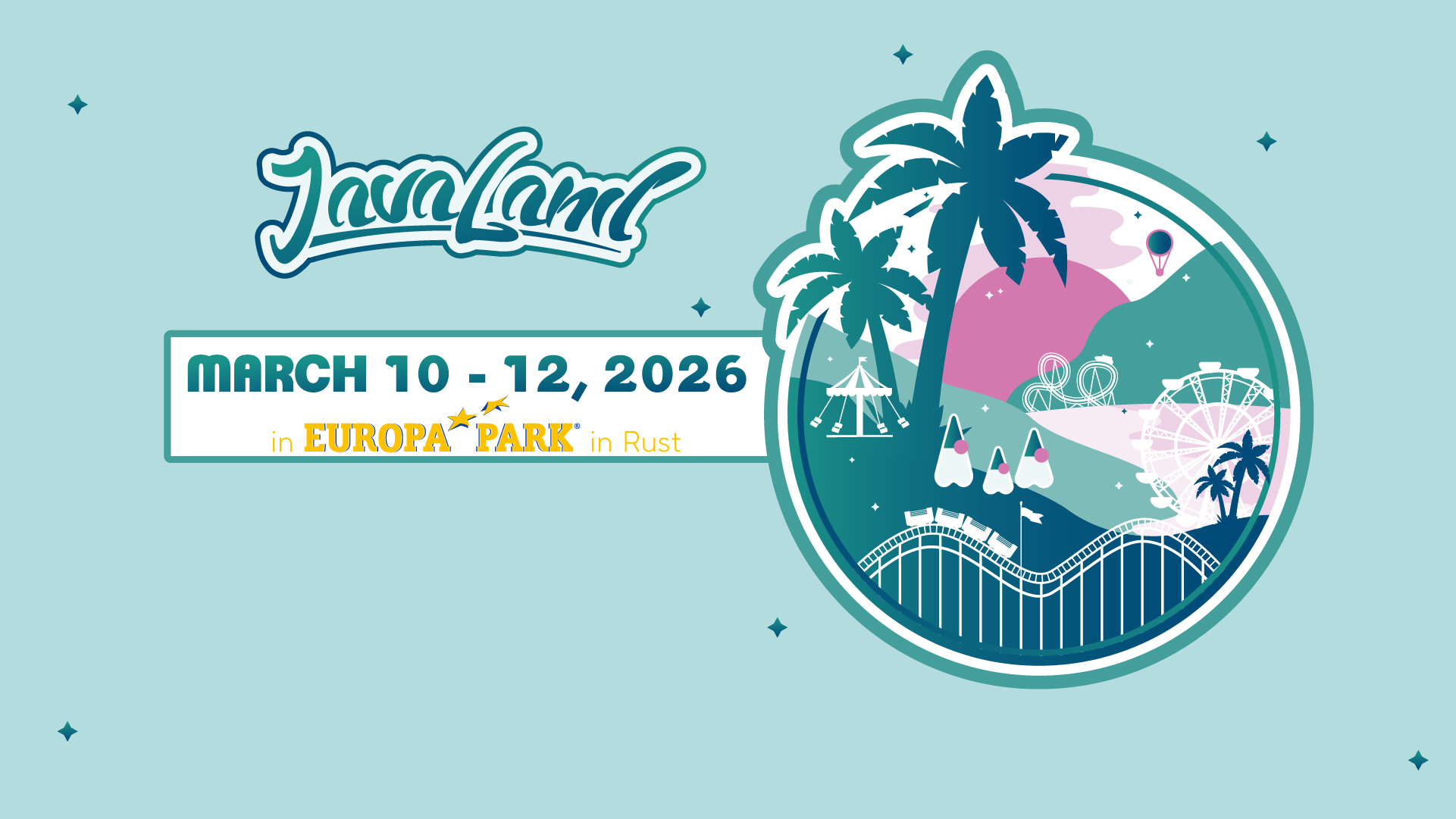10 Mar 2026
Termin
Die Konferenz findet vom 10. - 12.03.2026 im Europapark Rust statt.
Infos

Vom 10. bis 12. März 2026 findet wieder die JavaLand-Konferenz statt.
Zurück zu den Anfängen und ab in den Freizeitpark: Die JavaLand 2026 heißt euch vom 10. bis 12. März im Europa-Park willkommen! Entdeckt jetzt das Vortragsprogramm mit fast 130 Vorträgen in 13 verschiedenen Themenbereichen.
Es erwartet Dich ein spannendes Vortragsprogramm mit internationalen Top-Rednern und eine Menge Aktivitäten von der Community.
Beim anschließenden Schulungstag kannst Du Deine Kenntnisse noch etwas vertiefen.
Auch das Majug-Orga-Team ist dabei!
Bis zum 20. Januar gibt es einen Early-Bird-Preis. Hier gibt es Tickets.
22 Jan 2026
We are looking forward to a workshop by Andras Fejes about building AI applications using Quarkus and LangChain4J.
Speaker: Andras Fejes Language: English Location: Technische Hochschule Mannheim
Anmeldung
Please register on our Meetup page to help us with planing.
As this is a workshop with limited space, please also unregister if you can’t make it.
Location
For the first time, the Technische Hochschule Mannheim will be our host. Thanks a lot for this opportunity! We also welcome all interested students!
The workshop will take place in the Computer Science (Informatik) building (Speyerer Str. 4, 68163 Mannheim) in room A108.
Please note that parking is very limited, so rather take the tram line 1 to tram stop “Hochschule”.
Enter from Speyerer Str. 4, either from the street (you need to find your way around the fence of the building site) or via the entry to the parking space within the campus on the left of the building and entering the building from the rear.
Agenda
- 18:30 Uhr: door is open
- 19:00 Uhr: start of the workshop
- 20:30 Uhr: end of the workshop
Abstract
AI is rapidly moving from experimental prototypes to reliable components of modern software systems. For Java developers, the challenge is no longer if AI can be integrated, but how to do it effectively—bridging the gap between traditional enterprise architecture and the dynamic, context-driven world of Large Language Models (LLMs).
This session explores how LLMs and orchestration frameworks like LangChain4J can be leveraged in Java applications using function calling, tool integration, and the Model Context Protocol (MCP). We’ll look at how these concepts transform AI from a conversational assistant into a predictable, composable system component.
The discussion will cover:
The principles of LLM function calling and how context transforms AI responses from “guesses” into deterministic operations.
How to integrate AI workflows into Java backends using Quarkus and modern APIs.
The trade-offs, pitfalls, and real-world lessons learned while building production-ready AI-assisted tooling.
This is a workshop-style session designed for both hands-on participants and observers. If you plan to explore the code examples on your own machine, please ensure your laptop has at least 32 GB of RAM, as AI workloads are not lightweight.
Join us to discover how AI can become a practical and dependable part of Java-based systems—empowering developers to build applications that are not just intelligent, but contextually aware and operationally sound.
Bio
With over 25 years of experience in IT, Andras Fejes has worked across diverse business domains, including finance, public transport, telecommunications,
media, bioinformatics, and more. He is highly skilled in Java technologies, with deep expertise in Spring Boot, WildFly, Quarkus, and Java/Jakarta EE.
Currently, Andras is a Software Engineer at LivePerson, where he focuses on building real-time, cloud-based services using Spring Boot, Kafka, and Cassandra.
He’s passionate about creating high-performance, scalable solutions and exploring the latest innovations in cloud-native development.
Eine Veranstaltung des iJUG e.V., organisiert durch die JUG Mannheim (majug).
27 Nov 2025
Unser nächster Vortrag von Arnold Franke handelt von Microservices und den damit verbundenen Trade-Offs.
Sprecher: Arnold Franke Sprache: Deutsch Firma: synyx GmbH & Co. KG
Anmeldung
Um uns die Planung zu erleichtern, freuen wir uns über eure Anmeldung auf unserer Meetup-Seite.
Termin und Ablauf
Der Vortrag findet am 27.11.2025 um 19:00 Uhr bei BridgingIT GmbH, N7 5-6, 68161 Mannheim statt.
- Ab 18:30 Uhr: Einlass und Ankommen.
- 19:00 Uhr: Vortrag.
- 20:30 Uhr: Ende.
Abstract
Microservices sind irgendwie toll, das weiß ja inzwischen jeder. Aber vielen ist nicht bewusst,
dass man für diesen Architekturansatz auch einen Preis zahlt, der sich nicht immer lohnt.
Eines der schwierigsten Probleme in der Softwarearchitektur ist das Finden geeigneter
Schnitte zwischen Deploymenteinheiten verteilter Systeme (“Services”). Missverständnisse
und Fehlannahmen zu Architekturparadigmen wie “Microservices” führen immer wieder zu
schlechten Entscheidungen über Software-Schnitte, die schwer umzukehren sind und
schlechte Auswirkungen auf die Weiterentwicklung und Nachhaltigkeit eines Systems haben
können.
In diesem Talk werde ich versuchen, die verschiedenen Seiten des Trade-Off eines
Softwareschnitts zu beleuchten und so nah wie möglich an konkrete Lösungen für dieses
komplizierte “It depends” Problem zu kommen. Welche Probleme hole ich mir mit einem
Softwareschnitt ins Boot? Wann kann ich davon profitieren? Was sind weit verbreitete
Missverständnisse über Microservice Architektur? Welche Methoden und Heuristiken können
uns helfen, die richtige Entscheidung zu treffen? Wie hilft uns der modulithische Ansatz an
den Stellen, an denen ein Schnitt keinen Sinn macht? In welchen Situationen stehen wir vor
einer solchen Entscheidung und wie gehen wir sie an?
Neben Erkenntnissen aus Domain Driven Design und Team Topologies sowie Elementen der
Architekturansätze Microservices und Modulith enthält dieser Talk eine Menge real-life
Erfahrung aus Projekten mit verteilten Systemen. Der Talk wird die Zuhörer befähigen, bei
anstehenden Architekturentscheidungen die Schnitte ihrer Software besser abgewägt und
nachhaltiger zu wählen.
Bio
Arnold Franke ist seit 12 Jahren für synyx als Software Ingenieur, Berater und Architekt in
Projekten verschiedener Branchen unterwegs. Seine Motivation: Mit nachhaltigen Lösungen
geringer Komplexität echten Mehrwert für Menschen zu schaffen. Dabei hilft das
grundlegende Interesse und langjährige Erfahrung in allen Aspekten der Software Architektur
wie Team Strukturen, DDD, Event-Driven Design uvm. Diese Erfahrung, gesammelt mit
verteilten und monolithischen Systemen in der Cloud und auf Blech, teilt er gerne in Artikeln
für Publikationen wie dem Java Magazin und gelegentlichen Talks.
Eine Veranstaltung des iJUG e.V., organisiert durch die JUG Mannheim (majug).
29 Oct 2025
Bei unserem nächsten Vortrag von Falk Sippach geht es um die Neuerungen in Java 21 bis 25 sowie um einen Deep Dive in Value Objects.
Sprecher: Falk Sippach Sprache: Deutsch Firma: embarc Software Consulting GmbH
Anmeldung
Um uns die Planung zu erleichtern, freuen wir uns über eure Anmeldung auf unserer Meetup-Seite.
Termin und Ablauf
Der Vortrag findet am 29.10.2025 um 19:00 Uhr, bei LivePerson, Loksite, Glücksteinallee 69, 68163 Mannheim, statt.
- Ab 18:30 Uhr: Einlass und Ankommen.
- 19:00 Uhr: Vortrag.
- 20:30 Uhr: Ende.
Abstract
30 Jahre Java - Die Neuerungen in Java 21 bis 25
Alle halben Jahre erscheinen Major-Releases mit einer Vielzahl von neuen Features.
Manche starten als Inkubator und viele durchlaufen mehrere Preview-Phasen.
Und auch wenn wir die neuen Funktionen nicht direkt einsetzen können, lohnt sich immer der Blick auf den aktuellsten Stand.
Aktuell geht es um so spannende Themen wie Erweiterungen zum Pattern Matching, Bibliotheken rund um Virtual Threads wie Structured Concurrency, String Templates, Stream Gatherers, Flexible Constructor Bodies, Module Import Declarations, Simple Source Files and Instance Main Methods, die Class File API, Stable Values und Value Types.
Neben diesen verschiedenen JDK Enhancement Proposals (JEPs) werfen wir natürlich auch einen Blick auf hilfreiche API-Verbesserungen und Änderungen an der JVM, z. B. bei den Garbage Collectoren.
Ihr bekommt einen Überblick über die neusten Entwicklungen im Java-Umfeld und seht heute schon, was Euch in den nächsten Jahren in der täglichen Arbeit erwarten wird.
Value Objects - das nächste große Ding in Java
Einer der großen Pluspunkte von Java war und ist das statische, starke Typsystem.
Es hilft, viele Fehler bereits zur Compilezeit zu entdecken und macht die Entwicklung robuster sowie effizienter.
Allerdings integrieren sich die vor etwa 30 Jahren aus Performancegründen eingeführten primitiven Datentypen nicht gut mit modernen Ansätze wie Generics, Stream API oder Pattern Matching.
Value Objects versprechen Abhilfe und werden die Vorteile beider Welten kombinieren.
Damit können wir in Zukunft unveränderbare Datentypen entwerfen, die sich wie primitive Datentypen verhalten.
Das steigert nicht nur die Performance und senkt den Speicherverbrauch, es erhöht durch das Schreiben von ausdrucksstarken Typen auch die Les- und Wartbarkeit.
Schon seit etwa 10 Jahren wird im Rahmen vom Projekt Valhalla an dieser großen Änderung des Java Typsystems gearbeitet.
Daran hängen einige komplexe Fragestellungen, wie z. B. der Umgang mit Default-Werten sowie null-Values, der Umbau der Wrapper-Typen (Integer, …) und die Verwendung als generische Typisierung.
Im Sommer 2024 hat Java Language Architekt Brian Goetz verkündet, dass nach der langen Zeit der Durchbruch in der Umsetzung erreicht ist.
Darum wollen wir gemeinsam schauen, wie Value Classes, Null-Restricted und Nullable Types sowie erweitertes Primitive Boxing die Art und Weise verändern, wie wir in Zukunft programmieren werden.
Bio
Falk Sippach ist bei der embarc Software Consulting GmbH als Softwarearchitekt, Berater und Trainer stets auf der Suche nach dem Funken Leidenschaft, den er bei seinen Teilnehmern, Kunden und Kollegen entfachen kann.
Bereits seit 20 Jahren unterstützt er in meist agilen Softwareentwicklungsprojekten im Java-Umfeld.
Als aktiver Bestandteil der Community (Mitorganisator der JUG Darmstadt und Mitglied der Java Champions) teilt er zudem sein Wissen gern in Artikeln, Blog-Beiträgen, sowie bei Vorträgen auf Konferenzen oder User Group Treffen und unterstützt bei der Organisation diverser Fachveranstaltungen.
Eine Veranstaltung des iJUG e.V., organisiert durch die JUG Mannheim (majug).
02 Jul 2025
Unser nächster Vortrag von Tom Asel handelt von Architekturverantwortung.
Sprecher: Tom Asel Sprache: Deutsch Firma: tangible concepts
Anmeldung
Um uns die Planung zu erleichtern, freuen wir uns über eure Anmeldung auf unserer Meetup-Seite.
Termin und Ablauf
Der Vortrag findet am 02.07.2025 um 19:00 Uhr, bei LivePerson, Loksite, Glücksteinallee 69, 68163 Mannheim, statt.
- Ab 18:30 Uhr: Einlass und Ankommen.
- 19:00 Uhr: Vortrag.
- 20:30 Uhr: Ende.
Abstract
Architekturarbeit ist wichtig – aber wer ist eigentlich verantwortlich dafür?
In vielen Organisationen bleibt diese Frage unbeantwortet. Mal entscheidet das Team, mal die „Architekten“, mal das Management – und viel zu oft: niemand so richtig. Was fehlt, ist ein gemeinsames Verständnis davon, wie Architekturverantwortung organisiert und gelebt werden kann.
Diese Session beleuchtet, was zum Aufgabengebiet „Softwarearchitektur“ gehört, wie viel Führung nötig ist – und wo die Verantwortung für Architekturarbeit sinnvollerweise angesiedelt sein sollte. Es werden Prinzipien vorgestellt, an denen sich moderne Architekturarbeit orientieren kann, um mit dem stetigen Wandel Schritt zu halten – und ein Mindset zu fördern, das von Qualitätsbewusstsein und Verantwortung geprägt ist.
Die Teilnehmenden nehmen konkrete Impulse mit, um in der eigenen Organisation genau die Diskussion anzustoßen, die längst überfällig ist: Wer macht eigentlich was – und warum?
Bio
Tom Asel ist Co-Founder von tangible concepts, Java-Experte und Spezialist für Softwarearchitekturen. Als ehemaliger Leiter Software Engineering und Enterprise Architekt kennt er alle Ebenen des Softwareentwicklungsprozesses. In seiner Arbeit als Softwarearchitekt befähigt er Teams, selbstständig und effizient zu arbeiten und nachhaltige Lösungen zu entwickeln. Für ihn liegt der langfristige Erfolg darin, das Zusammenspiel des gesamten Teams zu fördern, anstatt auf Einzelpersonen zu setzen. Seine umfangreiche Erfahrung in der Architekturbewertung und -analyse sowie seine aktive Mitgliedschaft im iSAQB zeichnen ihn als erfahrenen Trainer und Berater aus, der zur Weiterentwicklung moderner Softwarearchitekturen beiträgt.
Eine Veranstaltung des iJUG e.V., organisiert durch die JUG Mannheim (majug).

